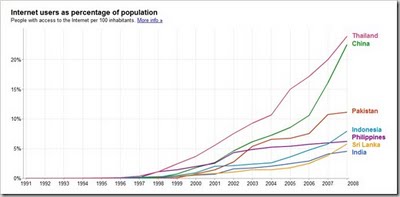
Familygate, Mediagate & Social Media Revolution in Pakistan
By Riaz Haq
CA
Social media revolution is well underway in Pakistan. The new media are coming of age, and trumping the traditional commercial media. Many of the top journalists in the mainstream media knew about Arsalan's corruption but it was through Youtube that the world first learned about it. The same pattern repeated itself when Duniya TV's incriminating off-air video footage found its way on Youtube.
Familygate or Arslangate:
It has now been established that Malik Riaz Husain of Bahria Town approached a number of top TV talk show hosts in Pakistan and shared detailed information, videos and documentation about $3.7 million in illegal payments made to Arsalan Iftikhar , the son of Chief Justice Iftikhar Mohammad Chaudhry, over several years. Others, including Chaudhry Aitazaz Ahsan, knew about it and shared it with Justice Chaudhry a while ago. While rumors swirled among the Capital insiders, the public at large was kept in the dark until recently when a video of Shaheen Sehbai talking about it surfaced on Youtube and forced the mainstream media to finally discuss it on air.
Here's Shaheen Sehbai breaking the scandal on Youtube:
http://www.youtube.com/watch?v=ZSpxlNc8x-8
Mediagate:
Several behind-the-scenes video clips of a Dunya TV talk show leaked on Youtube reveal the television hosts appearing to be helping Malik Riaz Husain prepare his answers, and in certain cases even spoon-feeding him the answers.
The leaked video also shows a son of Prime Minister Yousaf Raza Gilani and a daughter of Pakistan Muslim League (Nawaz) chief Nawaz Sharif calling in to try and influence the on-air contents. “Why don’t you start talking about it yourself, otherwise [if we ask] it will seem planted, which it is, but I don’t know if it should look planted,” says Ms Mehr Bukhari to Malik Riaz while Mr Lucman says, “I’ll say it on air that I’ve been 'pressurised' by Mian Amir Mehmood (Dunya TV's owner) and Malik Riaz to do this program.”
Here's two-part Duniya TV's leaked video on Youtube:
http://www.youtube.com/watch?v=hnSh5kBBnCQ
http://www.youtube.com/watch?v=OD5Vkhxnexs&feature=endscreen&NR=1
Questions:
The fact that mainstream media sat on these stories raises serious questions about whose interests are the journalists serving? What kind of illegal payments and other favors are they accepting from the rich and the powerful? How are the commercial interests of the media owners influencing the editorial opinions and news coverage? Are they trying to hide their own guilt? And to what end?
What's Next:
Free and independent media is often seen as an effective watchdog in a democracy. But the question being asked now is who's watching the watchdogs? One possible answer is that the new super watchdogs are the ordinary citizen journalists and bloggers who are active in the new cybermedia and not beholden to any special interests.
High-speed broadband expansion led by PTCL has propelled Pakistan to become the fourth fastest growing broadband market in the world and the second fastest in Asia, according to a recent industry report . Serbia leads all countries surveyed with a 68% annual growth rate from Q1 2010 to Q1 2011. Thailand (67%), Belarus (50%), Pakistan (46%), and Jordan (44%) follow Serbia. India is in 14th place worldwide with a 35% annual growth rate. 
In spite of rapid growth, the level of Internet penetration is Pakistan is still low. In a population of 177 million, only 18.5 million (10.4 percent) are connected to the Internet, though government officials quote a slightly higher figure of 20 million. Although it's twice that of India's Internet penetration of about 5% , Pakistan's penetration percentage is less than those in Tunisia (33.4 percent) and Egypt (21.1 percent). However, Internet use in Pakistan is growing at a rapid rate, particularly in urban centers where 40% of the population lives, which are also home to the middle class which often forms the backbone of mass-scale uprisings. Mobile Internet use shot up 161 percent in 2010 alone.
Summary:
I believe Pakistan is entering a new era of the Internet media. And I hope that the new social media will continue to enjoy sufficient freedom and growth to provide wide enough access in Pakistan for the citizen journalists to play their role as a watchdog where the mainstream commercial media fails. Sunlight is indeed the best disinfectant for the rot that characterizes Pakistan's power centers today.
Back to Pakistanlink Homepage
|

